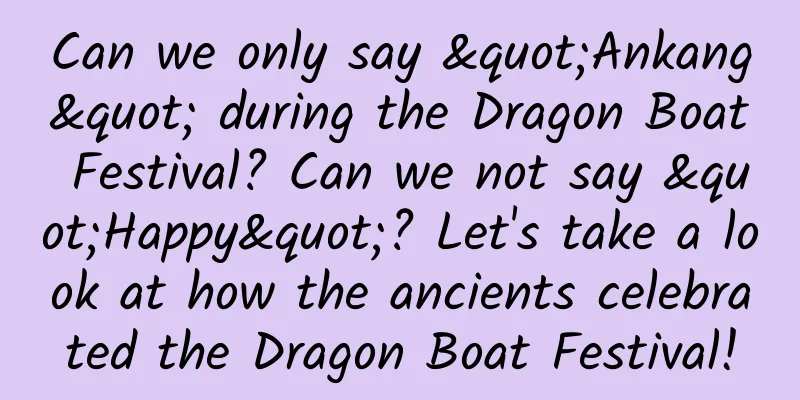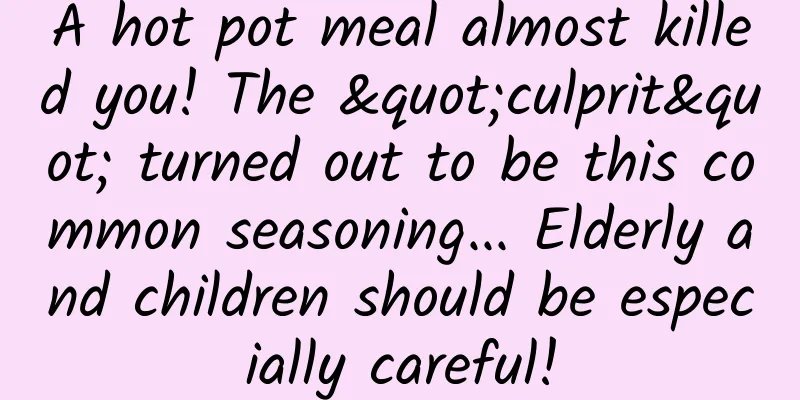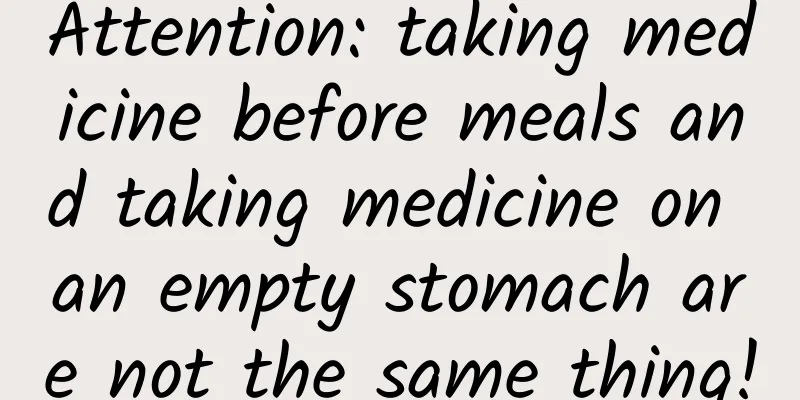Can we only say "Ankang" during the Dragon Boat Festival? Can we not say "Happy"? Let's take a look at how the ancients celebrated the Dragon Boat Festival!

|
Nowadays, the Dragon Boat Festival has basically become a "Zongzi Festival" in many places, as if there is no other way to celebrate except eating Zongzi. Moreover, we have heard since childhood that the Dragon Boat Festival seems to be invented to commemorate Qu Yuan (some say it is to commemorate Wu Zixu, Cao E and other figures). The ancient sages plus ancient texts sound serious. Around 2015, there was even a view on the Internet: Dragon Boat Festival cannot wish "happiness", but only "health" . The fact that this saying can be spread shows how serious and solemn the Dragon Boat Festival is in the eyes of many people today. If the ancients traveled back to today and saw this scene, they would definitely be full of questions, because although the ancients did celebrate the Dragon Boat Festival to commemorate Qu Yuan, they celebrated it in a very joyful way. The Dragon Boat Festival is a day to ward off evil spirits Most of the traditional Chinese festivals were created to ward off evil spirits, and the Dragon Boat Festival, which originated in the Eastern Han Dynasty, is a very representative example. What evil does it ward off? Eastern Han scholars had different understandings of this question. Today we will explain it in the most common way. Generally speaking, the ancients liked "yang energy" and hated "yin energy"; they liked daytime and hated night. In most areas of China, the summer solstice has the longest day , and the winter solstice has the longest night. However, the Chinese believe that "the summer solstice is the beginning of yin, and the winter solstice is the beginning of yang": the summer solstice has the longest day, but things will turn to the opposite extreme , and after this day, the nights will become longer, which means that the summer solstice is not a good day ; the winter solstice is the opposite, symbolizing the future and hope, and it is the most auspicious! In addition, the weather around the summer solstice is hot and humid, and pests and harmful microorganisms breed, making people very easy to get sick, which further confirms its sin. As a result, when ancient people mentioned the period around the summer solstice, they rarely said good things about this period. For example, the Qi Min Yao Shu quoted the Four Min Yue Ling by the Eastern Han scholar Cui Shi, saying that during this period, "Yang Qi begins to decline, Yin evil begins to sprout, warm air begins to flourish, and poisonous insects and pests flourish", which is a dangerous period of "Yin and Yang fighting, blood and Qi scattered". The "First Edition of Sibu Congkan" reproduces the image of the Ming manuscript of "Qimin Yaoshu" kept in Qunbilou. The ancients believed that odd numbers were yang and even numbers were yin. The fifth day of the fifth lunar month, which often floats around the summer solstice, was also seen as another symbol of bad luck. The father of Tian Wen, the Lord Mengchang, one of the "Four Princes of the Warring States Period", was Tian Ying, the Lord Jingguo, a prince and prime minister of Qi State, who was a man of considerable status and culture at the time. However, according to the "Records of the Grand Historian: Biography of Lord Mengchang", when Tian Wen's mother gave birth to this baby son on May 5, his father was terrified: a child born on this day cannot be kept, as everyone said that this day was unlucky and the child " would be unfavorable to his parents " and must be killed! His mother had no choice but to raise Mengchangjun secretly. Of course, his father's view was purely superstitious. According to historical records, Mengchangjun not only did not harm his father when he grew up, but also greatly helped his father's career. But even with Mengchangjun's example, the idea that "children born on May 5th are unlucky" has continued for thousands of years. The ancients thought that the summer solstice and May 5th were particularly "evil", so they had to do things to ward off evil spirits, such as picking hundreds of herbs, taking orchid baths, and hanging colorful ropes... These customs developed to the Eastern Han Dynasty, forming the Dragon Boat Festival on May 5th. "Book of the Later Han Dynasty·Rituals" says: "On May 5th, red ropes and five-color seals are used as door decorations to stop the evil spirits." Volume 4 of "Classified Collection of Arts and Literature" quoted Ying Shao's "Customs" in the Eastern Han Dynasty, saying: "On May 5th, those who tie colorful silk on their arms can ward off soldiers and ghosts, and prevent people from getting sick with fever. It is also because of Qu Yuan. " "Nan" is pronounced nuó, which means to drive away ghosts and ward off epidemics. "Wen" means "epidemic." Obviously, in the Eastern Han Dynasty, when scholars mentioned the Dragon Boat Festival, the first thing they thought of was to ward off evil spirits; there was probably a legend about Qu Yuan and the Dragon Boat Festival at that time, but it was quite non-mainstream. Until the Southern and Northern Dynasties, there was a novel called "Continuation of Qixie Ji" that told the story of Qu Yuan and the Dragon Boat Festival in detail. The book said that Qu Yuan jumped into the river and died on May 5th. Later, people often put rice in bamboo tubes (actually it was also a kind of zongzi, called zongzi) and threw it into the river to worship Qu Yuan. As a result, when someone was worshiping like this, Qu Yuan suddenly appeared in broad daylight! Qu Yuan said that this kind of worship is not good, and it will be eaten by dragons. The rice should be wrapped in neem leaves and tied with colorful ropes . The Song Dynasty Shaoxing edition of Yiwen Leiju copied this ghost story from the Xu Qixie Ji. The Song Dynasty writer Liu Kezhuang wrote a poem to comment on it: "Who would believe that the ghost of the ghost would still salivate over the glutinous rice dumplings thousands of years later?" On the surface, this story is about Qu Yuan, but in fact it is full of the flavor of warding off evil spirits: the leaves of the neem tree are not big, and are not suitable for wrapping rice. It was chosen because it contains azadirachtin, which can repel insects and was considered very evil-warding by the ancients; the five-colored rope is the evil-warding magic weapon just mentioned. What’s more, rice dumplings were originally used to ward off evil spirits. Zongzi: A Substitute for Turtle Sacrifice Volume 31 of Taiping Yulan quoted from Fengtu Ji by Zhou Chu of the Eastern Jin Dynasty (chǔ, the one who "eliminated the three evils" in history), saying that on the Dragon Boat Festival, people usually have to: "Boil fat turtle until it is well cooked. Remove the bones, add salt, fermented black beans, hemp, and water pepper, and it is called pickled turtle. Sticky rice is also called zongzi or jiaoshu, which represents the image of yin and yang being wrapped around each other. The turtle is on the outside and the meat is on the inside, with yang inside and yin outside, so it praises the time." Whether it is turtle, jiaoshu or bamboo tube zongzi, the soft meat or rice is wrapped in something relatively hard and firm (which the ancients believed to be very yang), in the hope that it would conform to the time, ward off evil spirits and bring peace . Perhaps because the meaning is too appropriate, after the Jin Dynasty, zongzi often appeared as a delicacy limited to the Dragon Boat Festival. "Qu Yuan" in "Continuation of Qixie Ji" emphasized that zongzi must be wrapped in neem leaves, not bamboo tubes. However, in later generations, tube zongzi continued to be popular, and neem leaves gradually became obsolete due to their small size. Large-leaf plants such as cattail, reed, lotus, and bamboo took over the important task of wrapping zongzi . Copyrighted stock images, reprinting and using may cause copyright disputes Zongzi has always been stuffed with meat or fruit, and there are different ways to eat them, such as dipping in sugar or frying in oil. There are also some strange zongzi, such as the one that the poet Xu Junqian of the Northern and Southern Dynasties ate on New Year's Eve with bayberry in it. If you think bayberry is not red enough, you can also put red wood, which was called "Sumu" in ancient times. Qu Dajun's "Guangdong Xinyu" said that in the early Qing Dynasty, there was a kind of zongzi in Guangdong that was "meat zongzi, with Sumu strips in the middle as the red heart, wrapped in bamboo leaves." Wrapping zongzi with wood, probably for a little color? The "First Edition of Sibu Congkan" reproduces the image of the movable type printed edition of "Yu Tai Xin Yong" by Wu Yunxiguan in the Ming Dynasty. Ancient people also had a game of eating zongzi. The note novel "Kaiyuan Tianbao Yishi" which records the story of the prosperous Tang Dynasty said that the game of shooting zongzi with a small bow was popular in Chang'an at that time. Zongzi was "slippery and difficult to shoot", so shooting it required a lot of skills. The more zongzi you shot, the more you could eat. Dragon Boat Races - the Ancient World Cup Zongzi is delicious and dragon boat racing is fun. Zhou Chu's "Fengtu Ji" mentioned that there was a custom of "boat racing" during the Dragon Boat Festival in the Jin Dynasty. Today, most people think of dragon boat racing as a fitness project. In ancient times, dragon boat racing was the World Cup of football at that time . Dragon boats used for competitions are often very expensive. During the heyday of the Tang Dynasty, Zhang Ju compiled a reference book for civil servants called "Dragon Tendon and Phoenix Marrow Judgment", in which there is a document saying that Luoyang needs to build ten new Dragon Boat Festival dragon boats, each costing 500 strings of cash. What does 500 guan mean? At that time, if I wanted to hire someone to do corvée labor for me for a month, it would cost about half a guan; even the monthly salary of a fifth-rank official was only 15 or 16 guan. In other words, a dragon boat was worth a thousand months' salary for the poor, or nearly three years' official income for a fifth-rank official. Copyrighted stock images, reprinting and using may cause copyright disputes Rowing such an expensive boat is certainly not for fun. During the race, there will be a brocade flag at the finish line, which is called a "championship flag" and is often bright red. Zhang Hu, a poet in the Tang Dynasty, said: "The blood of the orangutan is tied to the head flag, and the sky raises the painted oars in unison." There were countless spectators on both sides of the river. Luo Binwang wrote in his poem "Preface to Watching the Dragon Boat Race in Yangzhou": "The drums and music were resounding over the mountains and rivers, and the silk and satin were obscured by the clouds and the sun." The cheering music was louder than the sound of the river, and the curtains of the spectators were as high as the sky. At the sound of the command, the contestants rowed vigorously, and the audience was excited. A Tang Dynasty poet wrote a poem "Watching the Dragon Boat Race", which said: "The bruised eyebrows and bloody heads are fighting, and the heart of the one who loses to the shore is burning." After the race, the winner enjoys all the glory, while the loser hangs his head in despair. Ming Dynasty scholar Yang Sichang's "Wuling Race" records that after the dragon boat race in Wuling, "the winner gets more money, and neighbors and relatives come to congratulate him. The next day, they hang colorful decorations on the door, open a jar to perform plays, or write couplets and small poems on the city gate. They tie up dogs and hang turtles, and tie things like angelica, sedge, grass, and fruits to mock the losers. The losers, who are local people, will hang their heads and walk away if they happen to pass by, or their relatives and friends will give them the things they have in front of them to tease them. They talk about boats with great interest since April, and after May, whether they win or lose, they talk about it until August or September, and they never get tired of it. " Copyrighted stock images, reprinting and using may cause copyright disputes This topic is no less popular than the World Cup today, right? Many officials even complained that the people had given up farming for the dragon boat race. For example, Yuan Zhen (the one who wrote "Once you have seen the sea, you will never be satisfied with the water") said: "Set up a sign to make choices, to win or lose, to fight for life and death. Cheer for a while, and stop farming!" Liu Yuxi's "Song of Dragon Boat Race" says: "Customs are as wild as crazy at this time, looking at the clouds gathering on the bank of the river." A festival can make people spontaneously gather on the riverside like clouds, each one of them as if intoxicated and crazy. It is not difficult to see that the ancients really loved the Dragon Boat Festival and had a lot of fun during it . The ancients who invented the Dragon Boat Festival made rice dumplings, held banquets, recited poems, and raced dragon boats. It was a happy festival no matter how you looked at it. Back to the question, since the festivals were celebrated so happily, did the ancients really only say "well-being" to each other on this day? Although the ancients did not directly describe what to say to each other on the Dragon Boat Festival, Emperor Xuanzong of the Tang Dynasty, Li Longji, once wrote a poem on the Dragon Boat Festival called "Dragon Boat Festival Three Palaces Banquet for Ministers". In the preface of the poem, he said that he wanted to "beautify the mutual happiness between the monarch and his ministers ." It seems that even the emperors of ancient times paid great attention to "mutual happiness." As for you and me today, in fact, everyone is willing to say "happy" or "well-being", just use what you need . Just don't mistake this as a habit that has been around "since ancient times." Planning and production Author: Cleaner, PhD student at Nankai University Reviewer: Wang Hongzhi, Associate Professor, School of Humanities, Shanghai Normal University Planning丨Xu Lai Editor: He Tong Proofread by Xu Lailinlin The cover image and the images in this article are from the copyright library Reprinting may lead to copyright disputes |
<<: Want to lose weight but can’t control your diet? Let your brain help!
>>: In Antarctica, how to “build a house like building a car”?
Recommend
This highly poisonous plant feeds at least 800 million people. You must have eaten it.
A 17th-century natural history painting of cassav...
Guangzhou WeChat mini program distribution function, how much does it cost to develop a mini program distribution system?
Distributing mini programs is the future developm...
Your phone battery isn't durable? You may be doing these 5 things wrong
Some people say As long as the phone has power an...
What is quantum supremacy? What impact will quantum computers have on human civilization?
On October 24, 2019, Google released a 54-bit qua...
A comprehensive guide to APP promotion and operation knowledge: [Exchange]
What is exchange? n The significance of exchange ...
Why now isn't the best time to buy a Moto 360
When Google officially launched the Android Wear ...
30 Unforgettable HTML 5 Templates
In today's world, content management systems ...
After seeing this “bacteria level”, do you still dare to use toilet paper to wipe your child’s mouth?
Audit expert: Zhu Guangsi Member of Beijing Scien...
My understanding of operations from the perspective of a product manager
I have come into contact with many product manage...
Whose extra-long feathers are on the Peking Opera warrior's "head crown"? This "forest beneficial bird" has something to say
Chongqing Xuebaoshan National Nature Reserve rece...
Geely is on the list of the world's most valuable cars, and it is not far from surpassing Ford
Recently, Brand Finance, a well-known British bra...
How to do Valentine's Day marketing? Here are 6 tips for you!
Is Valentine’s Day Marketing Important? This time...
Will electric cars be more expensive than gasoline cars? When Ningde BYD cuts costs again, will the same price for gasoline and electric cars become a reality?
Recently, CATL and BYD have simultaneously releas...
The disaster is over, but the nightmare continues... Huaxi doctors: If you have these symptoms, be alert to PTSD
Today we will teach you a new word: PTSD Also cal...









